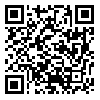Volume 7, Issue 1 (March 2025)
IEEPJ 2025, 7(1): 159-172 |
Back to browse issues page
Download citation:
BibTeX | RIS | EndNote | Medlars | ProCite | Reference Manager | RefWorks
Send citation to:



BibTeX | RIS | EndNote | Medlars | ProCite | Reference Manager | RefWorks
Send citation to:
Bekhnoodeh M, Havasi N, Besharat M A, Ahmadizadeh M J, Hossein-Zadeh-Taghvaie M. (2025). Effectiveness of Paradox Therapy on Post Traumatic Stress Disorder. IEEPJ. 7(1), 159-172. doi:10.22034/7.1.159
URL: http://ieepj.hormozgan.ac.ir/article-1-969-en.html
URL: http://ieepj.hormozgan.ac.ir/article-1-969-en.html
Masoumeh Bekhnoodeh1 

 , Nahid Havasi *2
, Nahid Havasi *2 

 , Mohammad Ali Besharat3
, Mohammad Ali Besharat3 

 , Mohmmad Javad Ahmadizadeh4
, Mohmmad Javad Ahmadizadeh4 

 , Marjan Hossein-Zadeh-Taghvaie1
, Marjan Hossein-Zadeh-Taghvaie1 




 , Nahid Havasi *2
, Nahid Havasi *2 

 , Mohammad Ali Besharat3
, Mohammad Ali Besharat3 

 , Mohmmad Javad Ahmadizadeh4
, Mohmmad Javad Ahmadizadeh4 

 , Marjan Hossein-Zadeh-Taghvaie1
, Marjan Hossein-Zadeh-Taghvaie1 


1- Department of Psychology, Karaj Branch, Islamic Azad University, Karaj, Iran
2- Department of Psychology, Karaj Branch, Islamic Azad University, Karaj, Iran ,havassi.n2020@gmail.com
3- Department of Psychology and Educational Sciences, University of Tehran, Tehran, Iran
4- Behavioral Sciences Research Center, Lifestyle Research Institute, Baqiyatollah University of Medical Sciences, Tehran, Iran.
2- Department of Psychology, Karaj Branch, Islamic Azad University, Karaj, Iran ,
3- Department of Psychology and Educational Sciences, University of Tehran, Tehran, Iran
4- Behavioral Sciences Research Center, Lifestyle Research Institute, Baqiyatollah University of Medical Sciences, Tehran, Iran.
Abstract: (1563 Views)
Objective: Extramarital relationships have witnessed an upward trend in recent years, constituting a significant factor contributing to familial disintegration, divorce, and, ultimately, a deterioration in societal well-being. Consequently, the current investigation was undertaken with the objective of evaluating the efficacy of paradox therapy in alleviating post-traumatic stress disorder symptoms among women adversely impacted by extramarital relationships.
Methods: The methodological framework of the present study was semi-experimental, employing a pre-test-post-test design alongside a control group, supplemented by a follow-up phase spanning two months. The research population encompassed all women who had experienced the consequences of their husbands' extramarital affairs and who sought psychological services at various psychology and counseling clinics located in Tehran. The sample for this investigation comprised 30 individuals who expressed a willingness to engage in the study and were selected through convenience sampling; however, during the course of the research, 3 participants withdrew from each group. The instrument utilized for data collection was the PTSD Checklist for DSM-5 (PCL-5), with data analysis employing analysis of variance with repeated measures.
Results: The findings indicated that paradox therapy exerted a statistically significant influence on the reduction of post-traumatic stress disorder symptoms in women affected by extramarital relationships (p<0.05).
Conclusions: Therefore, it is posited that paradox therapy may serve as a viable intervention in addressing psychological trauma and mitigating the symptoms of post-traumatic stress disorder resultant from extramarital relationships.
Methods: The methodological framework of the present study was semi-experimental, employing a pre-test-post-test design alongside a control group, supplemented by a follow-up phase spanning two months. The research population encompassed all women who had experienced the consequences of their husbands' extramarital affairs and who sought psychological services at various psychology and counseling clinics located in Tehran. The sample for this investigation comprised 30 individuals who expressed a willingness to engage in the study and were selected through convenience sampling; however, during the course of the research, 3 participants withdrew from each group. The instrument utilized for data collection was the PTSD Checklist for DSM-5 (PCL-5), with data analysis employing analysis of variance with repeated measures.
Results: The findings indicated that paradox therapy exerted a statistically significant influence on the reduction of post-traumatic stress disorder symptoms in women affected by extramarital relationships (p<0.05).
Conclusions: Therefore, it is posited that paradox therapy may serve as a viable intervention in addressing psychological trauma and mitigating the symptoms of post-traumatic stress disorder resultant from extramarital relationships.
Type of Study: Original |
Subject:
Educational Psychology
Received: 2024/02/25 | Accepted: 2024/09/23 | Published: 2025/03/1
Received: 2024/02/25 | Accepted: 2024/09/23 | Published: 2025/03/1
Send email to the article author
| Rights and permissions | |
 |
This work is licensed under a Creative Commons Attribution-NonCommercial 4.0 International License. |




